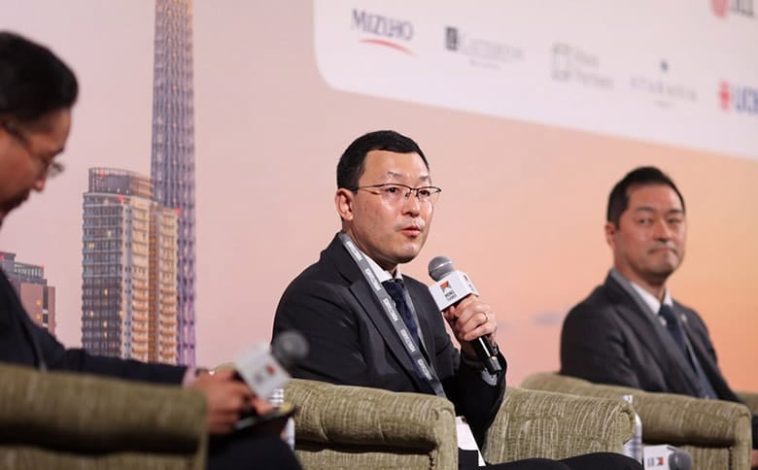With equity prices for most Japanese REITs continuing to trade below the value of their assets, managers of public and private real estate trusts have been exploring new ways to improve yields to attract investors, according to senior executives from KKR, Development Bank of Japan, United Overseas Bank and Orix Life Insurance speaking at Mingtiandi’s inaugural Tokyo Forum this past week.
Despite the return of inflation to the Japanese economy and the Bank of Japan’s March move away from its long-standing negative interest rate policy, the Tokyo Stock Exchange’s REIT Index has slid more than 20 percent in the last three years, after effectively doubling from 2010 through 2020.
“We are currently focusing on market inflation,” Naoki Suzuki, president of KKR-controlled REIT player KJR Management said at the forum. “There are environments emerging in various sectors where rents can be raised. In this context, we are focusing on increasing cash flow from our existing portfolio, which remains our current approach.”
Suzuki’s fellow panelists agreed that fund managers have been exploring ways to boost yields and attract investors including by looking for ways to stay ahead of inflation, target high yield sectors and leverage tourism growth after the pandemic.
Inflation Presents Opportunity
“The environment now will allow us to raise rents for tenants in various sectors, and with that, we should be able to improve cash flow,” Suzuki said. “That is the focus of our management efforts at the moment and this is a remarkable change given that, until recently, tenants refused even to talk about rents.”
Masakuni Taka, senior director for investment with the private assets division of Orix Life Insurance speaking at the forum
Owned by US fund management giant KKR, KJR manages Tokyo-listed Japan Metropolitan Fund Investment Corporation, which in 2023 acquired two rental residential assets in Greater Tokyo for a combined JPY 5.39 billion ($35 million).
“Rents for residential assets and hospitality assets are gradually rising,” echoed Hayato Tsuji, general manager of the real estate finance department at government-owned Development Bank of Japan. “Japan has seen a strong recovery in inbound tourism after the pandemic. We are looking to minpaku (housing used for private lodging services), as quality, large hotels are already scarce.”
Singapore-headquartered United Overseas Bank, also sees potential in Japan’s hospitality industry as the country’s inbound tourism boom continues, according to Atsushi Sato, head of the bank’s financial institution group for Japan.
“The luxury resort sector, and business for all types of hotels is really brisk,” Sato said. “People (in Singapore and Hong Kong) know a lot more about Japanese tourist locations than I do. Inbound tourism is very strong.”
Rate Increases to Remain Gradual
While UOB expects interest rates will continue to rise, Sato predicts that the upswing will be gradual, which should limit the impact on investors’ cost of capital.
Some REITs are expected to suffer from slightly higher capital costs and soaring construction expenses, but the environment has created new business opportunities, KJR’s Suzuki observed. “There are few REITs which have borrowed at variable interest rates and the prices for these funds could fall still further. This challenge has already generated talk of REIT mergers, so we expect some interesting investment opportunities.”
KKR established itself as a significant player in Japan’s REIT market in 2022 when it acquired what is now KJR through a $2 billion purchase of a local fund management joint venture from UBS and Mitsubishi Corporation.
The company now appears to be on the cusp of acquiring Fuji Soft in a $4 billion deal which is seen by many analysts as a play for the Japanese software maker’s property holdings.
Earlier this month, Mitsui Fudosan Logistics Park completed a merger with Itochu-sponsored Advance Logistics Investmenr Corporation to create a combined REIT with a portfolio of 49 industrial assets valued at JPY 576.5 billion.
Favoured Sectors
While rents have been on the rise, that increase in income has not been equally realized across property sectors, said Masakuni Taka, senior director for investment with the private assets division of Orix Life Insurance.
Among the sectors that are seeing expansion in leasing rates are rental residential and hospitality, Taka indicated. “We find that the younger generation is more receptive to significant increases in housing rents, and asset managers have shown that they can raise rents each year. I think residential properties are strong against inflation.”
The panel was moderated by Hideaki Suzuki, executive director and head of business development services for North Asia at Cushman & Wakefield.
A Panel in Pictures





GIPHY App Key not set. Please check settings